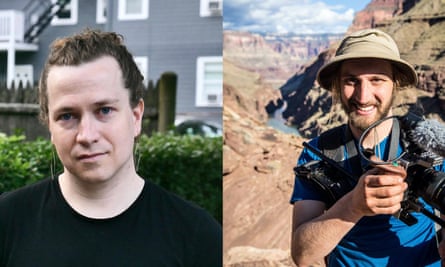E
During their high school years in the late 2000s, Rin Axelman was a strong supporter of Zionism. As a gift for their bat mitzvah, they were given a copy of Leon Uris’ 1958 novel, Exodus. The book was a popular bestseller and played a role in solidifying American Zionism. Axelman described the novel as a heroic and almost legendary account of the establishment of the state of Israel, which had a significant impact on them.
After completing Exodus, Axelman developed a strong interest in Israel, according to sources. They expressed thoughts of potentially enlisting in the Israeli armed forces and indulging in the idea of relocating there. Their fascination stemmed from the narrative of Jews reclaiming their homeland.
During high school, a teacher noticed Axelman’s eagerness and suggested they explore the history of Palestine. This sparked a realization for Axelman. Up until then, the narratives they had been taught only briefly mentioned Palestinians or portrayed them as obstacles. However, after spending a year reading works by Palestinian historian Rashid Khalidi and left-leaning Israeli historian Tom Segev, their perspective shifted. They compared this process to what they had learned about the history of the US in school, where the narrative of refugees or immigrants building a city on a hill and establishing a democracy was empowering. However, learning about the Native Americans made them realize that this narrative was missing important aspects.
The shift in viewpoint served as the catalyst for the production of the film Israelism, which was co-directed by Axelman and Sam Eilertsen. The documentary presents the argument that American Jews are often presented with a narrative that disregards the existence of Palestinians, focusing instead on the story of Jews fleeing persecution and returning to their ancestral homeland. This narrative has had a significant impact on shaping international perspectives on Israel and its alliances with the US in the Middle East.
The movie centers on the experiences of two young American Jews – Simone Zimmerman, who attended a Jewish school and participated in an exchange program in Israel, and Eitan (last name not disclosed), who enlisted in the Israel Defence Forces (IDF) after graduating high school. Zimmerman characterizes her experience as a process of “indoctrination” and “mass mobilization” to transform her into a supporter of Israel within the US. It portrays an education and advocacy system that expects pro-Israel activism from certain young Jewish Americans. There is a particular emphasis on the teachings of birthright, which offers free trips to Israel for Jews living around the world and is funded by the Israeli government.
The movie depicts young American Jewish students at an elementary school proudly waving Israeli flags and chanting, “We want to go! We want to go!” At a private middle school for Jewish students, the children are captured reading Alan Dershowitz’s book, The Case for Israel. At birthright events in Jerusalem, large crowds of American teenagers are shown enthusiastically cheering for the Israeli Defense Forces while a speaker encourages them to be advocates for Israel and influence public opinion in its favor.
The documentary follows the journey of various individuals who experience a change, often by engaging with Palestinians and traveling to the West Bank. It showcases a rising movement among Jewish individuals, particularly young ones, who seek to advocate for Palestinian rights and diminish the significance of Israel in American Jewish culture.

The film was produced prior to the October 7th terrorist attack by Hamas in Israel and the subsequent bombing of Gaza. However, there has been a significant increase in demand for the film in recent weeks. The creators are currently hosting virtual screenings every week, and their tour of the US and Europe is experiencing sold-out shows. Axelman shared, “We have received many requests from people who want to show this film to their families and help them gain a better understanding.”
The pair states that promoting the movie after the October 7th attacks has been challenging. Axelman shared that when they visited Israel-Palestine at 21, they volunteered at a hostel with an Israeli man who is dedicated to anti-occupation efforts and co-runs the hostel with Palestinian individuals. Sadly, both of his parents were killed by Hamas, and watching him express his grief in interviews has been heartbreaking. The recent events have been incredibly tough for their team, as many members have lost loved ones or fear for their safety.
According to Axelman, their movie aims to shed light on the complexity of emotions currently surrounding the conflict. They argue that it is impossible to fully comprehend the perspectives of those involved without first understanding the narratives they have been exposed to. Axelman explains, “If we view Israel solely as the land of the Jewish people, it may seem like a simple narrative with Hamas as the sole perpetrators of evil terrorism.” However, they note that while Hamas has indeed committed horrific acts that have greatly traumatized the Jewish community, it is also important to acknowledge the ongoing brutal oppression faced by Palestinians for most of their lives.

Axelman was raised in a small rural area in Maine with a tight-knit Jewish community. Their parents were part of the hippie generation, similar to Bernie Sanders. Axelman and their sibling were the only Jewish students at their high school. They were often teased for being different and this made it challenging for them to develop a strong sense of their Jewish identity. As a young individual, they struggled with feeling like an outsider and trying to understand the atrocities of the Holocaust and antisemitism.
Studying Israel provided comfort. “It is a fact that the country has a rich ancient history, so it is understandable that it holds a strong emotional significance. This is particularly true as our ancestors needed to flee from Europe.”
Eilertsen, who also co-directed the film, had similar experiences with the portrayal of Israel during his childhood. He noted that in the reform and conservative Jewish communities, Israel was often presented as a kind of “Jewish Disneyland,” a place where Jews could fully embrace their identity.

Upon arriving at Brown University, Axelman encountered fellow young individuals who had initially been indoctrinated to blindly support Israel but later changed their perspective after interacting with Palestinians and learning about their experiences.
The individual in charge of Brown Students for Israel, who later joined the strongly pro-Israel Anti-Defamation League, was known for harassing Palestinian students. Now, ten years later, some of those same students are involved in advocating for Palestinian human rights. This shift in perspective among former pro-Israel student leaders inspired Axelman to create the documentary.
The movie also suggests that certain Jewish communities in America use their cultural support for Israel as a means of intense political involvement. It depicts how Hillel, a Jewish organization present on many college campuses in the US, encourages Jewish students to engage in pro-Israel activism, often with former IDF soldiers present at their meetings. One person interviewed, Sarah Anne Minkin, who is the programs director at the Foundation for Middle East Peace, describes a network of institutions that essentially transform “young Jews into advocates for Israel”.

According to the film, a major factor in this phenomenon is the involvement of the pro-Israel advocacy organization, the American Israel Public Affairs Committee (Aipac).
Eilertsen explained that the combination of energy and education often leads to active political lobbying for Israel. They recorded individuals who attended Aipac conferences during their time in Jewish high school, where lobbying for Israel was emphasized. This lobbying prioritizes depoliticizing support for Israel and framing it as an emotional obligation rather than a political stance. Criticizing Israel is often dismissed as antisemitism in this context.
The directors highlight Aipac’s consistent backing of Donald Trump, despite his failure to denounce anti-Semitic white supremacists, as proof of the organization’s emphasis on advocating for Israel above other concerns.
Zimmerman, who attended Aipac conferences during high school, sees it as a routine aspect of her upbringing. She believes it is a tactic to instill the belief in young Jewish individuals that they must fight for Israel, whether physically or in the realm of public opinion.
Zimmerman and the creators of the film emphasize that the United States has a multitude of strategic concerns in the Middle East that are distinct from the influence of the Israel lobby. According to Zimmerman, these countries’ foreign policies are at play, but they often use the narrative of protecting Jews as a convenient excuse to justify other aspects of their foreign policy.
The filmmakers are specific in their critique of Aipac and emphasize that it does not represent the entirety of American Jews. This community is diverse and includes those who are anti-Zionist and have no ties to Israel. According to Eilertsen, making exaggerated claims about Aipac’s power can lead to anti-Semitic beliefs. However, it is a fact that Aipac and similar groups, such as Democratic Majority for Israel, hold significant influence on Capitol Hill and are credited with helping elect preferred candidates and defeat those who are deemed unsupportive of Israel. Eilertsen argues that acknowledging this influence is not a conspiracy theory, but rather a valid observation, and dismissing it as anti-Semitic is an unreasonable deflection.
There is disagreement among individuals. In an article for the Jewish Journal, a Los Angeles-based weekly publication, writer David Suissa argues that Israelism promotes the idea that intense Zionist activism has led to a disillusioned younger generation of Jews who now oppose Israel. A representative from the UCLA chapter of Students Supporting Israel, a pro-Zionist organization, expressed concerns about the film being biased and containing propaganda.
The filmmakers recognize that there are individuals who attend the showings and do not support the concept of the movie, choosing instead to pose challenging inquiries. They welcome this type of discourse, according to them. However, Eilertsen reveals that at every screening, someone has approached them and shared, “This is my experience as well.”

The film also highlights the optimistic attitude it portrays, revealing that due to college experiences, increased communication, and the influence of the Jewish progressive movement, numerous young Jews have developed a more advanced stance on Israel. It features a large-scale protest at the birthright organization’s main office, where Jewish activists call for a more truthful conversation.
Zimmerman expressed that amidst this terrible time, the one thing that brings her hope is the increasing number of people who are removing their blinders. She believes that individuals will no longer believe the falsehoods they were taught and will instead have the bravery to confront the truth about Israel, rather than the idealized version.
-
Israeli film “Israelism” is currently being shown in person at various locations throughout the United States, as well as available to watch for free online. For more information, please visit https://www.israelismfilm.com/screenings.
Source: theguardian.com



















